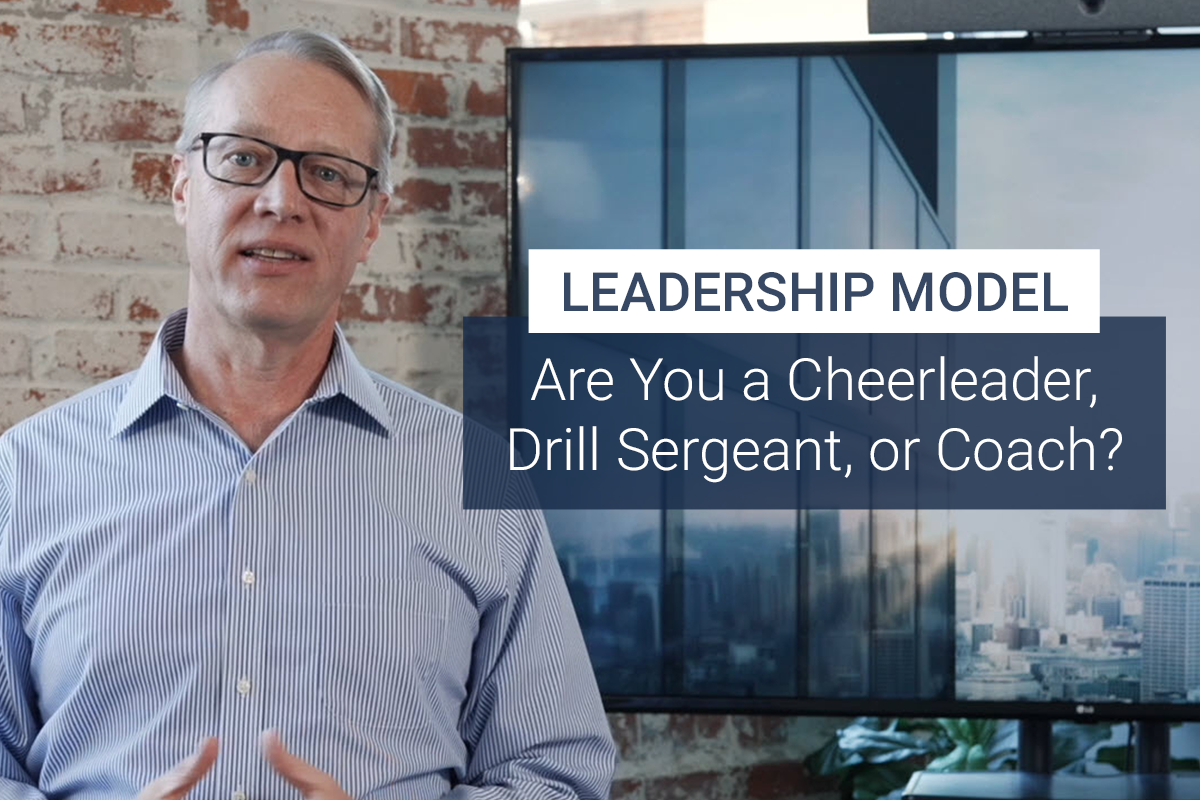I recently heard sports psychologist Dan Abrahams recommend that players develop a mental model for how they want to compete. Perhaps they want to play like a lion – strong, fierce, and fast. Or perhaps they could focus on competing the way their favorite professional athlete plays the game. Keeping that image in mind helps them to perform better and avoid the hesitation and negative self-talk that hurt performance.
That got me thinking, “As leaders, who should we model ourselves after?” It seems that some leaders see themselves as a cheerleader – their role is to encourage and inspire their team. Other leaders seem to see themselves as a drill sergeant – they push their people and hold them accountable.
But I would suggest that a better mental model is that of a sports coach. An effective coach – and an effective leader – must inspire and encourage but also challenge and hold accountable. Here are five things you can do to lead effectively and get the most from your team.
1. Create perspective.
Help them understand how they fit into the big picture and why what they do matters. Inspire them like a coach who explains why this game is important and how it helps the team achieve its larger goals.
2. Set clear expectations.
Just as athletes need to understand what their role is in the offense or defense, your people need to know what you expect from them. What are their responsibilities and objectives? Lack of clarity is a leading cause of poor performance, conflict, and burnout.
3. Challenge them to do more.
Paradoxically, we thrive when we are asked to do more than we think we can do. It’s how we learn, grow, and gain confidence. Coaches push their teams to get stronger, faster, and play better together, and you should do the same. Here’s what the author of the book Multipliers: How the Best Leaders Make Everyone Smarter has to say about this:
“Good leaders don’t just give people more work, they give them harder work – a bigger challenge that prompts deep learning and growth.” – Liz Wiseman
4. Check in with them.
Like a coach checking on a player during a game, check in regularly with your direct reports to see how they are doing. Whether through formal bi-weekly one-on-ones or informally checking in with them, they need to know you care about how they’re doing and are willing to help. Our CEO regularly calls us or stops by our offices to ask, “How are you doing? Is there anything you need?” That little check-in helps us stay connected and motivated.
5. Give feedback.
Provide “compassionate candor” to them – this is what the Apostle Paul calls “speaking the truth in love.” In order to perform our best, we all need accountability and feedback – both positive (encouragement) and constructive (how we can improve). And don’t wait until the annual review. Rather, provide continuous feedback along the way, particularly after key events such as a project completion, a major meeting, etc. Would a coach wait until the end of the season to review an athlete’s performance? Of course not – that would be too late! Instead, they talk about it after each game (and sometimes even after an important practice). Here’s what legendary NCAA basketball coach John Wooden says:
“A coach is someone who can give correction without causing resentment.” – John Wooden
So, what is your mental model for being the best leader of your team? We would love to hear your thoughts on this or see how we could help you achieve your leadership goals. Contact us.
Gray Wirth has served more than 30 years as a leader in corporate, nonprofit, small business, and military contexts. He has successfully led organizations ranging from 100 to 3,100 employees. Gray has lived and worked in five different countries, been a CEO, and accumulated more than 25 years of experience on nonprofit and for-profit boards. He brings experience in executive coaching, strategic planning, and advising boards of directors and business owners. As a Certified Exit Planning Advisor (CEPA®), Gray helps business owners plan in advance for future transitions to ensure that their business, personal, and financial objectives will be achieved. Gray is a U.S. Army veteran and holds a B.S. from Cornell University, an M.B.A. from Harvard University, and an M.A.R. from Westminster Theological Seminary.




![Developing a Successful Sales and Marketing Strategy [VIDEO]](https://images.squarespace-cdn.com/content/v1/571fc0ea1d07c0fd6d72c167/1770391559147-9Z6Q4BC1EY0R8BUHCATM/sales+blog.png)
![Gratitude: A Silver Bullet for Strengthening Morale [VIDEO]](https://images.squarespace-cdn.com/content/v1/571fc0ea1d07c0fd6d72c167/1768246672364-PQNI8VHO5EEPZ3IRMY7F/gratitude+blog.png)
![Public Speaking: Using AI Ethically & Effectively to Create a Powerful Speech [VIDEO]](https://images.squarespace-cdn.com/content/v1/571fc0ea1d07c0fd6d72c167/1763735597032-XMIKMQ1D63PRC1QJ6FVV/ai+speech+blog.png)
![Preparing for the (Expectedly) Unexpected [VIDEO]](https://images.squarespace-cdn.com/content/v1/571fc0ea1d07c0fd6d72c167/e4193bcf-29f7-46c2-be12-9116791d40cf/unexpected+blog.png)
![Fundraising: How to Raise Funds for Your Nonprofit [VIDEO]](https://images.squarespace-cdn.com/content/v1/571fc0ea1d07c0fd6d72c167/1757619882819-6OARWR0QU11M7LA0ABYL/fundraising+blog.png)
![Culture: 5 Traits That Set Healthy Churches & Their Leaders Apart [VIDEO]](https://images.squarespace-cdn.com/content/v1/571fc0ea1d07c0fd6d72c167/1755633039402-KVJFNJWG0RKBCMLS5FNB/healthy+blog.png)
![Vision: 3 Must-Have Traits of Every Successful Visionary Leader [VIDEO]](https://images.squarespace-cdn.com/content/v1/571fc0ea1d07c0fd6d72c167/1749484247758-ITEGD2LZZ716112KLHXZ/visionary+blog.png)
![Advisory Boards: Should Your Business Have an Advisory Board? [VIDEO]](https://images.squarespace-cdn.com/content/v1/571fc0ea1d07c0fd6d72c167/1747149791510-HU20SY0O8LRPEHGMC6HD/advisory+blog.png)
![Leadership: How to Be a World Class Boss [VIDEO]](https://images.squarespace-cdn.com/content/v1/571fc0ea1d07c0fd6d72c167/1744640489138-X5LUNZT3JTRQYSSZXV1C/boss+thumbnail.png)
![Conflict: The Importance of Having Tough Conversations [VIDEO]](https://images.squarespace-cdn.com/content/v1/571fc0ea1d07c0fd6d72c167/1741365599296-KTWEJ5PTNH1BX2GJ9REJ/Conversations+blog.png)
![Exit Planning: The Challenge of Business Exit Planning & Why It Matters to You [VIDEO]](https://images.squarespace-cdn.com/content/v1/571fc0ea1d07c0fd6d72c167/1738339040891-VIW87N2NCZUCKLYNOHB6/exit+blog.png)

![Teams: Is Your Team Dysfunctional? [VIDEO]](https://images.squarespace-cdn.com/content/v1/571fc0ea1d07c0fd6d72c167/1733243870005-NOI69Z74DLNVLIB8MRRJ/dysfunctional+blog.png)
![How to Recruit and Inspire Volunteers [VIDEO]](https://images.squarespace-cdn.com/content/v1/571fc0ea1d07c0fd6d72c167/1728421227208-6JAUFVXEJW5KK6YE58JR/volunteers+blog.png)
![Trust: 4 Steps to Rebuild Damaged Trust [VIDEO]](https://images.squarespace-cdn.com/content/v1/571fc0ea1d07c0fd6d72c167/1725969594417-7AN9PJO2X8TTR77ACDFP/trust+blog.png)
![Blind Spots: How to Identify & Avoid Blind Spots in Your Organization [VIDEO]](https://images.squarespace-cdn.com/content/v1/571fc0ea1d07c0fd6d72c167/1722610352594-FAXECLPC61QYJH2I5YT8/blind+spot+blog.png)
![Family Business: Will the Family Business Destroy Our Family? [VIDEO]](https://images.squarespace-cdn.com/content/v1/571fc0ea1d07c0fd6d72c167/1718027719043-MU9AYPTQ7GM4XWT9EGD1/destroy+blog.png)
![Teams: How to Breathe New Life into a Broken Team [VIDEO]](https://images.squarespace-cdn.com/content/v1/571fc0ea1d07c0fd6d72c167/1714749389916-G2CWVK8OM1JJSD9058CL/breathe+blog.png)
![Planning: The Power of Planning [VIDEO]](https://images.squarespace-cdn.com/content/v1/571fc0ea1d07c0fd6d72c167/1712597764732-WHRZPRLZ6V78CBGKBPZA/PLanning+blog.png)
![Leveling Up Your Leadership: Becoming an Effective Senior Leader [VIDEO]](https://images.squarespace-cdn.com/content/v1/571fc0ea1d07c0fd6d72c167/1710266273593-QN3HEBJ5FII4GKQFH91Q/leveling+up+blog.png)
![Recruiting & Retaining “Mature” Team Members [VIDEO]](https://images.squarespace-cdn.com/content/v1/571fc0ea1d07c0fd6d72c167/1707849950823-Y5WJLYXM6ZPU55TKG27Y/recruitment+blog.png)

![Gaslighting: How to Identify It & Take Back Control [VIDEO]](https://images.squarespace-cdn.com/content/v1/571fc0ea1d07c0fd6d72c167/1699381799669-Y6XNYG2X3ZD1US80XAFY/Gaslighting+blog.png)
![Decision-Making: Why Smart Leaders Do Dumb Things [VIDEO]](https://images.squarespace-cdn.com/content/v1/571fc0ea1d07c0fd6d72c167/1696947285846-ZIA5M26B5AF9SRFGWFPV/Dumb+Things+blog.png)

![Meeting Effectiveness: 4 Different Types of Meetings & Why It Matters [VIDEO]](https://images.squarespace-cdn.com/content/v1/571fc0ea1d07c0fd6d72c167/1690296011536-23CWWE2VJ40QJ0UA1EZY/meetings+blog.png)
![Leadership: 4 Directions You Need to Lead [VIDEO]](https://images.squarespace-cdn.com/content/v1/571fc0ea1d07c0fd6d72c167/1689105063370-WQTIN47T3TP8YXQM3RMP/directions+blog.png)
![Leadership Model: Are You a Cheerleader, Drill Sergeant, or Coach? [VIDEO]](https://images.squarespace-cdn.com/content/v1/571fc0ea1d07c0fd6d72c167/1686670057921-DJ286QE8OZOQKE22SZAL/coach+blog.png)
![Developing Women Leaders: The Power of Leader Efficacy [VIDEO]](https://images.squarespace-cdn.com/content/v1/571fc0ea1d07c0fd6d72c167/1683572272369-EJ4N7BBXL0832YUM4XUN/Women+efficacy+blog.png)
